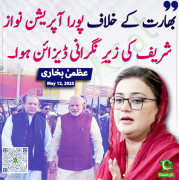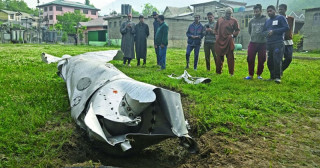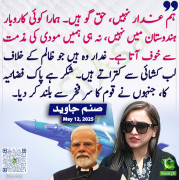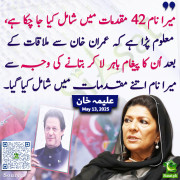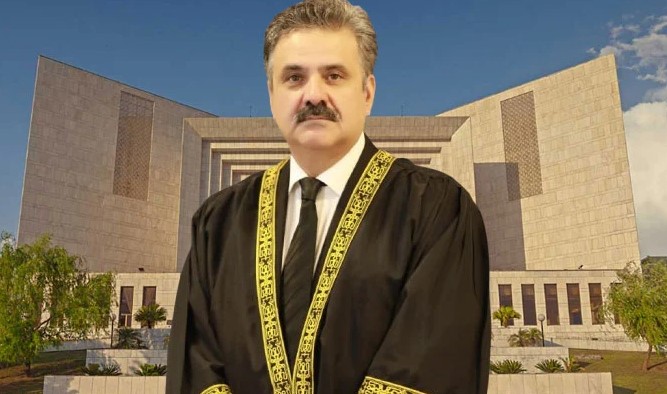You are using an out of date browser. It may not display this or other websites correctly.
You should upgrade or use an alternative browser.
You should upgrade or use an alternative browser.
BBC Says Pakistan Is Prepared To Deliver Nuclear Bomb To Saudi Arabia Whenever They're Ready
- Thread starter SMAAS
- Start date
Keepinformed
Siasat.pk - Blogger
SMAAS, your profile states that you are 20 years old and your avatar suggests that you love Pakistan Army.
Just out of interest, have you applied for ISSB yet? I think 19 or 20 is the age isn't it?
Just out of interest, have you applied for ISSB yet? I think 19 or 20 is the age isn't it?
SMAAS
Senator (1k+ posts)
SMAAS, your profile states that you are 20 years old and your avatar suggests that you love Pakistan Army.
Just out of interest, have you applied for ISSB yet? I think 19 or 20 is the age isn't it?
pata nahi app ko kia bethey bethey pasouri per gae hai jo video wekhnay ne ki bajae app mere peachay lug ge ho. pata nahi jani ager bisti kerne ka mood hai to ker do mujey koi tension nahi.
SMAAS
Senator (1k+ posts)
[h=1]Pakistan Army Chief Takes Over at Tumultuous Time[/h] [h=2]Raheel Sharif's Reputation as Moderate May Temper Relations With Civilian Government[/h]
By Annabel Symington
Updated Nov. 28, 2013 10:06 p.m. ET

Pakistan's newly appointed army chief General Raheel Sharif attended the change of command ceremony at army headquarters in Rawalpindi Friday. Reuters
KARACHI, Pakistan—Lt. Gen. Raheel Sharif takes the reins of Pakistan's powerful army Friday, amid hopes that his reputation as a moderate will temper relations with the civilian government in a country that was ruled by the military through half of its history.
Gen. Sharif was appointed Pakistan's army chief Wednesday in a surprise move by Prime Minister Nawaz Sharif, who passed over two more-senior generals.
The decision is seen as an attempt by the prime minister to bolster civilian authority over the army that twice ousted him from power in the past, said Raza Rumi, an Islamabad-based analyst. Prime Minister Sharif "has used the limits of his powers to select the No. 3. He has used his discretion and not gone by the internal military rules of giving preference to seniority," Mr. Rumi said.
Gen. Sharif, 57 years old, succeeds Gen. Ashfaq Parvez Kayani, who retired from the helm of the world's sixth-largest army on Thursday. Gen. Kayani served an unusually long term after being granted a three-year extension by the previous government—a move resented within the army as it blocked the promotions of other officers.
The new army chief is described by analysts and retired army officers as a moderate who views the internal threats posed by Islamic militants, especially the Pakistani Taliban, as his key challenge—not the traditional enemy, India, even though Gen. Sharif lost a brother in a war against India in 1971.
In his previous role as Inspector General Training and Evaluation, Gen. Sharif was in charge of the army training manual, which was revised to concentrate more on the internal threat and guerrilla warfare, said people familiar with his career.
"He's worked on training and organizing the army, especially with respect to the threat of terrorism," a military official said.
Educated at the Royal College of Defence Studies in the U.K., Gen. Sharif visited Fort Eustis, Va., in March with a delegation of Pakistani army officers to see the U.S. Army's training centers.
The new army chief and the prime minister aren't related. But both have roots in the Kashmir territory, which is divided between India and Pakistan.
Gen. Sharif is known as a "true soldier" who takes orders and implements them without question, according to retired Brigadier Samson Sharaf.
That could have weighed on Prime Minister Sharif's mind, after his previous choice as army chief, Gen. Pervez Musharraf, showed alarming independence and took Pakistan into conflict with India in 1999. Months later, Gen. Musharraf ousted Mr. Sharif and ruled as a military dictator for nine years.
Yet just like Gen. Sharif, Gen. Musharraf was the third most senior among the generals vying for the army chief job.
Mr. Sharif's first term as prime minister was curtailed by then-army chief Gen. Waheed Kakar, whom he had appointed only 10 months earlier. Gen. Kakar pressured Mr. Sharif to resign, precipitating the 1993 polls that brought to power the rival Pakistan Peoples Party.
Last year, when speculation of an imminent coup against the previous government swirled through Pakistan and tensions with the army and the judiciary reached fever pitch, Gen. Sharif was part of a group of senior officers who "pulled the army back," said a senior former government official.
At the time, Gen. Sharif and the other officers said the army needed to address deteriorating relations with the civilian government, and to remain mindful of the army's relationship with the U.S., the former official said. The Pakistani military receives around $700 million in aid from the U.S. each year, more than 60% of total American assistance to Pakistan.
As army chief, Gen. Sharif will have to deal with the fallout from the withdrawal of U.S.-led coalition troops from neighboring Afghanistan next year.
U.S. military and civilian officials see Pakistan's cooperation as vital to Washington's regional strategy. The new army chief may also have to take military action against militants in the Northern Waziristan tribal area bordering Afghanistan, after the government's attempts at a peace initiative have faltered.
The army is wary of Mr. Sharif's decision to negotiate with the Pakistani Taliban. If the new chief launches an operation against the militant strongholds, it could strain the fragile equilibrium in civilian-military relations.
Some retired officers and analysts warned that Mr. Sharif's decision to bypass the two top generals may breed discontent within the army; it broke his promise to make the decision strictly based on seniority.
As part of the reshuffle, Mr. Sharif named Lt. Gen. Rashad Mahmood, the second most senior candidate who was widely seen as Gen. Kayani's preferred choice for army chief, as chairman of the Joint Chiefs of Staff Committee, a technically superior but largely ceremonial position.
The top-ranking candidate, Gen. Haroon Aslam, resigned Thursday after being overlooked for promotion, the army's spokesman said. Widely popular in the ranks, Gen. Aslam led operations against the Taliban in the Swat valley in 2009. However, he was director of military operations during Gen. Musharraf's coup that ousted Mr. Sharif in 1999—one of the reasons why he may have been bypassed, some retired officers said.
By Annabel Symington
Updated Nov. 28, 2013 10:06 p.m. ET

Pakistan's newly appointed army chief General Raheel Sharif attended the change of command ceremony at army headquarters in Rawalpindi Friday. Reuters
KARACHI, Pakistan—Lt. Gen. Raheel Sharif takes the reins of Pakistan's powerful army Friday, amid hopes that his reputation as a moderate will temper relations with the civilian government in a country that was ruled by the military through half of its history.
Gen. Sharif was appointed Pakistan's army chief Wednesday in a surprise move by Prime Minister Nawaz Sharif, who passed over two more-senior generals.
The decision is seen as an attempt by the prime minister to bolster civilian authority over the army that twice ousted him from power in the past, said Raza Rumi, an Islamabad-based analyst. Prime Minister Sharif "has used the limits of his powers to select the No. 3. He has used his discretion and not gone by the internal military rules of giving preference to seniority," Mr. Rumi said.
Gen. Sharif, 57 years old, succeeds Gen. Ashfaq Parvez Kayani, who retired from the helm of the world's sixth-largest army on Thursday. Gen. Kayani served an unusually long term after being granted a three-year extension by the previous government—a move resented within the army as it blocked the promotions of other officers.
The new army chief is described by analysts and retired army officers as a moderate who views the internal threats posed by Islamic militants, especially the Pakistani Taliban, as his key challenge—not the traditional enemy, India, even though Gen. Sharif lost a brother in a war against India in 1971.
In his previous role as Inspector General Training and Evaluation, Gen. Sharif was in charge of the army training manual, which was revised to concentrate more on the internal threat and guerrilla warfare, said people familiar with his career.
"He's worked on training and organizing the army, especially with respect to the threat of terrorism," a military official said.
Educated at the Royal College of Defence Studies in the U.K., Gen. Sharif visited Fort Eustis, Va., in March with a delegation of Pakistani army officers to see the U.S. Army's training centers.
The new army chief and the prime minister aren't related. But both have roots in the Kashmir territory, which is divided between India and Pakistan.
Gen. Sharif is known as a "true soldier" who takes orders and implements them without question, according to retired Brigadier Samson Sharaf.
That could have weighed on Prime Minister Sharif's mind, after his previous choice as army chief, Gen. Pervez Musharraf, showed alarming independence and took Pakistan into conflict with India in 1999. Months later, Gen. Musharraf ousted Mr. Sharif and ruled as a military dictator for nine years.
Yet just like Gen. Sharif, Gen. Musharraf was the third most senior among the generals vying for the army chief job.
Mr. Sharif's first term as prime minister was curtailed by then-army chief Gen. Waheed Kakar, whom he had appointed only 10 months earlier. Gen. Kakar pressured Mr. Sharif to resign, precipitating the 1993 polls that brought to power the rival Pakistan Peoples Party.
Last year, when speculation of an imminent coup against the previous government swirled through Pakistan and tensions with the army and the judiciary reached fever pitch, Gen. Sharif was part of a group of senior officers who "pulled the army back," said a senior former government official.
At the time, Gen. Sharif and the other officers said the army needed to address deteriorating relations with the civilian government, and to remain mindful of the army's relationship with the U.S., the former official said. The Pakistani military receives around $700 million in aid from the U.S. each year, more than 60% of total American assistance to Pakistan.
As army chief, Gen. Sharif will have to deal with the fallout from the withdrawal of U.S.-led coalition troops from neighboring Afghanistan next year.
U.S. military and civilian officials see Pakistan's cooperation as vital to Washington's regional strategy. The new army chief may also have to take military action against militants in the Northern Waziristan tribal area bordering Afghanistan, after the government's attempts at a peace initiative have faltered.
The army is wary of Mr. Sharif's decision to negotiate with the Pakistani Taliban. If the new chief launches an operation against the militant strongholds, it could strain the fragile equilibrium in civilian-military relations.
Some retired officers and analysts warned that Mr. Sharif's decision to bypass the two top generals may breed discontent within the army; it broke his promise to make the decision strictly based on seniority.
As part of the reshuffle, Mr. Sharif named Lt. Gen. Rashad Mahmood, the second most senior candidate who was widely seen as Gen. Kayani's preferred choice for army chief, as chairman of the Joint Chiefs of Staff Committee, a technically superior but largely ceremonial position.
The top-ranking candidate, Gen. Haroon Aslam, resigned Thursday after being overlooked for promotion, the army's spokesman said. Widely popular in the ranks, Gen. Aslam led operations against the Taliban in the Swat valley in 2009. However, he was director of military operations during Gen. Musharraf's coup that ousted Mr. Sharif in 1999—one of the reasons why he may have been bypassed, some retired officers said.
Keepinformed
Siasat.pk - Blogger
pata nahi app ko kia bethey bethey pasouri per gae hai jo video wekhnay ne ki bajae app mere peachay lug ge ho. pata nahi jani ager bisti kerne ka mood hai to ker do mujey koi tension nahi.
? That was a serious question but if you do not want to answer, I apologize.
Anyways thanks for the vid.
Keepinformed
Siasat.pk - Blogger
Pakistan and Saudia are best friends of west, why these gentlemen are they so worried?
Budget cuts for the BBC or bad ratings?
I for one would vote for Pakistan to play its part as a bridge to stabilize Saudi/Iran relations. It serves Pakistan's internal interests too because Pakistan has a significant number of shia population plus it shares a border with Iran.
Iran is fixing its relationship with the US as well. Saudi is already a partner, therefore this BBC report is rubbish for now.
Good shia/sunni relationship is only going to strengthen the umma not make it weak.
SMAAS
Senator (1k+ posts)
? That was a serious question but if you do not want to answer, I apologize.
Anyways thanks for the vid.
sorry bahi mein samjha app tanzia tor per sawal poch rahey they, muger mere taraf se mazrat. InshahAllah jald he karoun ga abi mein apnay maqsad ke taraf ragib hoon muger dushwarioyaan dekhney per rahi hai hein zara se wo sort out ho jae tou hazir hai apni jaan Army k liye.
-
-
-
-
سیاست کی اندھی محبت۔۔۔۔۔سہیل وڑائچ
5 | FORUM -
کنول شوزب علیمہ خان کے خلاف میدان میں
20 | خبریں -
Imran Khan's sons break their silence
27 | FORUM
-
-
-
کنول شوزب علیمہ خان کے خلاف میدان میں
20 | خبریں
-
© Copyrights 2008 - 2025 Siasat.pk - All Rights Reserved. Privacy Policy | Disclaimer|

